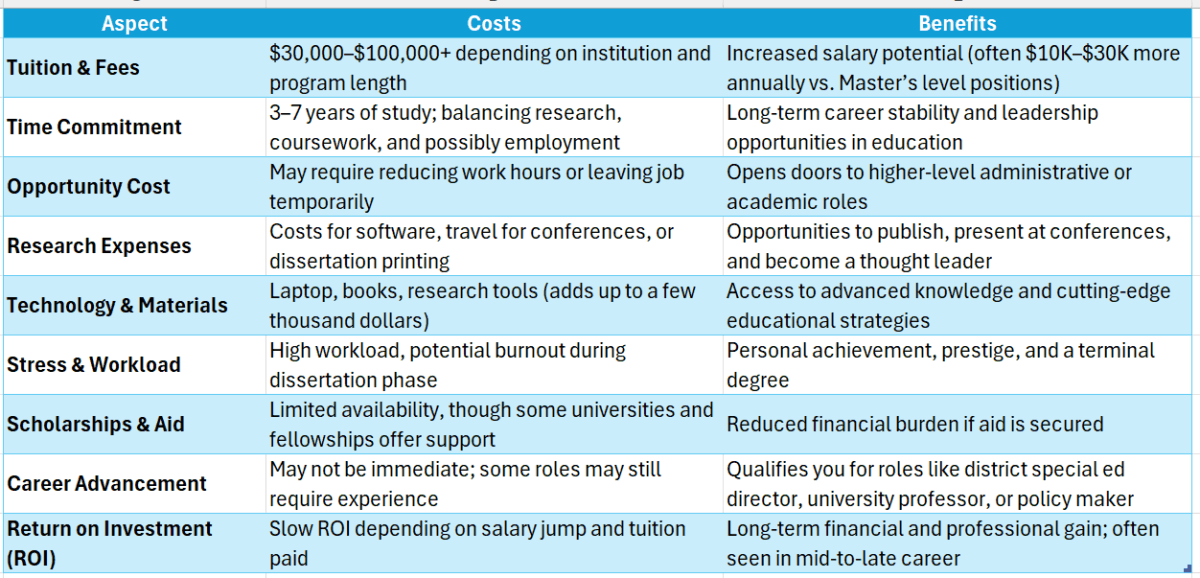
When considering a career in special education, many wonder, “Is a doctorate in special education worth it?” This question is crucial because it can shape your future, influence your career path, and impact the lives of countless students. Let’s explore the value of pursuing this advanced degree.
Career Advancement
A doctorate in special education can open doors to leadership roles. With this degree, you might become a school administrator or a district-level coordinator, guiding policies that affect students with disabilities.
Increased Earning Potential
Holding a doctorate often leads to higher salaries. For instance, educators with a doctorate in counselor education typically earn more than those with only a master’s degree. This financial boost can make the investment worthwhile.
Specialized Knowledge
Doctoral programs provide in-depth knowledge about special education laws, teaching strategies, and research methods. This expertise can enhance your ability to support students effectively, making a significant difference in their educational experiences. In states like California, various doctor of education programs in California offer unique opportunities to specialize further. These programs often focus on innovative practices and current challenges in special education, preparing graduates to lead change in their communities.
Study smarter, not harder—Enroll online today!
Is a Doctorate in Special Education Necessary for Career Advancement?
When considering a career in special education, many ask, “Is a Doctorate in Special Education Worth It?” This question is crucial because it can shape your future in this rewarding field. A doctorate can open doors, but is it necessary for career advancement?
A doctorate in special education can significantly enhance your career. Here are some key points to consider:
- Leadership Opportunities: With a doctorate, you can take on leadership roles in schools or educational organizations. This can lead to positions like director of special education or even policy-making roles.
- Higher Earning Potential: Typically, those with a doctorate earn more than their peers with only a master’s degree. This can make the investment worthwhile in the long run.
- Expanded Knowledge: Pursuing a doctorate in counselor education or doctor of education programs in California can deepen your understanding of special education, making you a more effective advocate for students.
In conclusion, while a doctorate in special education isn’t strictly necessary, it can provide valuable advantages for those looking to advance their careers in this important field.
Exploring the Financial Investment: Costs vs. Benefits of a Doctorate in Special Education

When considering a doctorate in special education, many ask, “Is it worth the investment?” This question is crucial, especially for those passionate about making a difference in the lives of students with disabilities. Understanding the costs and benefits can help you make an informed decision about your future.
The Costs to Consider
- Tuition Fees: Doctorate programs can be expensive. In California, for instance, tuition for doctor of education programs in California can vary widely, often exceeding $30,000.
- Time Commitment: Earning a doctorate typically takes 3-5 years, which means potential lost income during that time.
The Benefits to Weigh
- Higher Salary Potential: Graduates with a doctorate in special education often earn significantly more than those with just a master’s degree.
- Career Advancement: A doctorate can open doors to leadership roles in education, such as becoming a school administrator or a professor.
- Impact on Policy: With a doctorate, you can influence educational policies and practices, making a broader impact on the field of special education.
Ultimately, deciding whether a doctorate in special education is worth it depends on your career goals and financial situation. If you’re passionate about advocating for students with special needs, the investment may pay off in both personal fulfillment and professional advancement.
What Career Opportunities Open Up with a Doctorate in Special Education?
When considering whether a doctorate in special education is worth it, it’s essential to explore the career opportunities that come with this advanced degree. A doctorate can open doors to various roles that not only enhance your career but also make a significant impact on the lives of students with special needs.
With a doctorate in special education, you can pursue several rewarding career paths, including:
Leadership Roles
- University Professor: Teach future educators and conduct research in special education.
- Program Director: Oversee special education programs in schools or organizations, ensuring they meet the needs of students.
Counseling and Support
- Educational Consultant: Advise schools on best practices for special education, helping to improve student outcomes.
- Doctor of Education Programs in California: Many programs offer specialized training in counseling, preparing you to support students and families effectively.
Research and Policy Making
- Researcher: Contribute to the field by studying effective teaching methods and interventions for students with disabilities.
- Policy Analyst: Work with government or non-profits to shape policies that affect special education funding and practices.
The Impact of a Doctorate in Special Education on Student Outcomes
When contemplating the value of a doctorate in special education, it’s essential to consider its impact on student outcomes. This advanced degree empowers educators to significantly enhance the lives of students with disabilities by fostering effective learning environments.
Enhancing Teaching Skills
A doctorate equips educators with advanced strategies, enabling them to:
- Develop tailored lesson plans
- Implement evidence-based practices
- Advocate effectively for students’ needs These skills not only improve teaching but also boost student confidence and success.
Leadership Opportunities
Pursuing a doctorate in counselor education or special education opens doors to leadership roles, allowing graduates to become:
- School administrators
- Policy makers
- Advocates for special education reform These positions enable them to influence educational policies, benefiting students on a larger scale.
Research Contributions
Additionally, this degree allows educators to contribute to vital research, helping to:
- Share findings with peers
- Influence curriculum development
- Shape future educational practices Such contributions can lead to improved outcomes for students with disabilities.
Networking and Collaboration
Earning a doctorate also fosters professional connections, allowing educators to:
- Join specialized organizations
- Attend conferences
- Collaborate on projects These opportunities enhance the educational experience for students.
Personal Growth
Finally, this journey promotes personal growth, challenging educators to:
- Expand their knowledge
- Develop critical thinking skills
- Reflect on their practices This growth enriches both the educator and their students.
Study smarter, not harder—Enroll online today!
How Does a Doctorate in Special Education Enhance Your Expertise?
When considering a career in special education, many ask, “Is a Doctorate in Special Education Worth It?” This question is crucial because it impacts your career trajectory, salary potential, and ability to make a difference in students’ lives. Let’s explore how earning a doctorate can enhance your expertise and open new doors.
Deepening Your Knowledge
A doctorate in special education dives deep into advanced theories and practices. You’ll learn about the latest research, innovative teaching methods, and effective strategies to support diverse learners. This knowledge not only boosts your confidence but also equips you to tackle complex challenges in the classroom.
Career Advancement Opportunities
Earning a doctorate can lead to various career paths, including:
- Leadership roles: Become a principal or administrator.
- Higher education: Teach at universities or colleges.
- Consulting: Advise schools on special education policies. These opportunities often come with higher salaries and greater job satisfaction, making the investment worthwhile.
Networking and Collaboration
Doctor of education programs in California often provide networking opportunities with other educators and professionals. Collaborating with peers can lead to new ideas, partnerships, and even job offers. This community support is invaluable as you navigate your career in special education.
Real-Life Success Stories: Graduates Who Transformed Their Careers
When considering whether a doctorate in special education is worth it, real-life success stories can provide valuable insights. Many graduates have transformed their careers and made significant impacts in the field. Let’s explore some inspiring examples that highlight the benefits of pursuing advanced education.
Inspiring Transformations
- Emily’s Journey: After earning her doctorate in special education, Emily became a leader in her school district. She developed innovative programs for students with disabilities, significantly improving their learning outcomes. Her expertise also opened doors for her to present at national conferences.
- Mark’s Impact: Mark, who pursued a doctorate in counselor education, found that his advanced knowledge allowed him to create a counseling center focused on special needs.
His center has become a vital resource for families, showcasing how a doctorate can lead to meaningful change. These stories illustrate that a doctorate in special education or related fields, like doctor of education programs in California, can lead to fulfilling careers. Graduates not only enhance their skills but also contribute positively to their communities, making the investment worthwhile.
How Scholarship.Education Can Support Your Journey to a Doctorate in Special Education
Deciding whether a doctorate in special education is worth it can feel overwhelming. However, understanding the support available can make your journey clearer and more manageable. At Scholarship.Education, we believe that pursuing advanced education is a powerful step toward making a difference in the lives of students with special needs.
- Expert Guidance: Our team offers personalized advice on navigating the complexities of doctorate in special education programs. We help you find the right fit for your goals and interests.
- Resource Access: With access to a wealth of resources, including articles, webinars, and networking opportunities, you’ll be well-equipped to tackle your studies and research projects.
- Community Connection: Join a vibrant community of educators and professionals. Sharing experiences and insights can inspire you and provide valuable support throughout your journey.
Pursuing a doctorate in counselor education or doctor of education programs in California can open doors to leadership roles and specialized knowledge. At Scholarship.Education, we’re committed to helping you explore these options, ensuring you feel confident and prepared as you embark on this rewarding path.
Study smarter, not harder—Enroll online today!
FAQs
1. What is a Doctorate in Special Education?
A Doctorate in Special Education is an advanced degree designed for individuals who want to become experts in the field of special education, focusing on teaching methods, research, and policies to support students with disabilities.
2. What can I do with a Doctorate in Special Education?
Graduates can pursue careers as university professors, researchers, policy analysts, school administrators, or specialists in special education programs. Many also take leadership roles in developing educational strategies or advocacy for individuals with disabilities.
3. What are the requirements to apply for a Doctorate in Special Education?
Typically, applicants need a master’s degree in special education or a related field, a strong academic record, relevant professional experience, and often a statement of purpose or research interests.
4. How long does it take to complete a Doctorate in Special Education?
On average, it takes 3-5 years to complete a doctorate in special education, depending on the program structure and whether you are attending full-time or part-time.
5. What are the key areas of study in a Doctorate in Special Education?
The program typically covers topics such as:
-
Advanced research methods in education
-
Special education laws and policies
-
Curriculum design for students with disabilities
-
Behavioral and educational interventions
-
Leadership and advocacy in special education
6. Do I need teaching experience to pursue this doctorate?
While teaching experience is often preferred, it is not always required. However, practical experience in special education can strengthen your application and may be required for some programs.
Related Blogs
- Where to Get a Doctor of Education Programs in California?
- What Is a Doctorate in Counselor Education?
- Can You Earn an Online Doctorate in Educational Psychology?
- Best Online Doctorate in Higher Education?
- What Can You Do With a Doctorate in Adult Education?
- How to Get a Doctorate in Art Education? A Complete Guide
- Is a Doctorate in Early Childhood Education Right?
- What Is a Doctorate in Education Administration?
- Where to Get a Doctorate in Math Education?
- What Scholarships for Doctoral Students in Education?
- Best Doctorate in Nursing Education Online Programs?
- Is a Doctorate in Science Education Worth It?
- How to Pursue a Doctorate in Educational Psychology?
- How to Get a Doctorate in Educational Technology?
- Can You Earn an Doctorate in Educational Technology Online?





